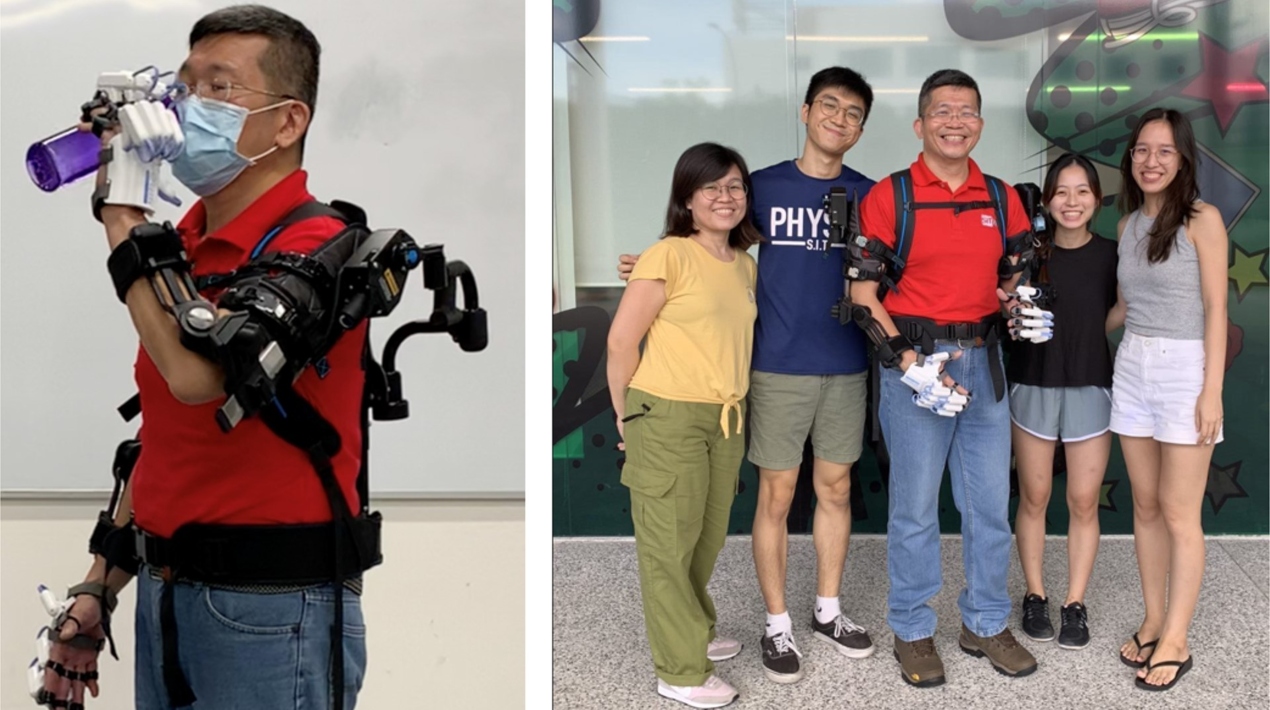
The impact of rehabilitation robots on the recovery of stroke victims and individuals with disabilities has recently been the focus of several research investigations headed by associate professor Wee Seng Kwee of the Singapore Institute of Technology.
“A loss of independence is devastating to many stroke survivors and often affects their emotional and psychological well-being. Enabling them to perform simple daily tasks helps patients regain their sense of control and confidence; improves their self-esteem and psychosocial well-being; and boosts their cognitive health,” says Associate Prof Wee.
HandyRehab is a lightweight, wireless robotic exoskeleton that weighs less than a can of soda. It aims to retrain weaker muscles and restore various hand functions and movements in patients with hand weakness caused by post-neurological insults such as stroke, traumatic brain injury, and spinal cord injury.
Associate Prof Wee conducted a research study with a group of Year 4 Physiotherapy students to test the HandyRehab robot. The study’s 10 stroke participants were recruited through collaboration with different hospitals and the research team.
The researchers created a list of 50 tasks that patients may complete with the HandyRehab robot at the end of the experiment. The list would serve as a thorough reference guide for physiotherapists and occupational therapists in clinical practice. The activities include, among others, opening a jar, writing with a pen, drinking a cup of water, using a computer mouse, and hanging up washing.
The robot detects muscle activation using electromyographic (EMG) sensors on its body. When a user makes small muscle twitches, the robot opens and closes the user’s hand. The physiotherapist can also use a computer tablet to manipulate the hand wirelessly.
As a result, people who lack muscle activation can nonetheless perceive hand movements and carry out some daily duties. Intensive and repetitive task-specific training can enhance brain plasticity and patient healing over time.
Devices such as the HandyRehab robotic exoskeleton can provide stroke sufferers with life-changing benefits. One of the study’s participants was overjoyed when wearing the hand robot allowed her to grasp a broom and clean the floor. It gave her optimism that intensive rehabilitation therapy would allow her to resume activities she enjoyed before her stroke.
His students were likewise affected by the encounter. Aside from learning about the functioning aspects of rehabilitation robots in real life, the students were able to see firsthand how technology can improve people’s lives.
Associate Prof Wee noted that they conducted their research in patients’ homes wherever possible, rather than in a clinical setting. This is something they are aiming for. Receiving therapy at home is more convenient for patients; therapists can provide more accurate assessments and suggestions for the patient’s therapy and care.
Unsurprisingly, such advanced rehabilitation methods are costly. Associate Prof Wee, on the other hand, is optimistic that increased demand for rehabilitation technology will make them more inexpensive in the future, allowing more patients to benefit from utilising the gadgets in their own homes.
While technology can do miracles, no device can replace a therapist’s knowledge and the time they take to understand each patient’s specific needs. Robotic treatment for rehabilitation must be provided by a therapist with specialised clinical and technical knowledge.
Before selecting proper training parameters on a rehabilitation device or system and customising rehabilitation therapy to maximise patients’ functional recovery, a therapist must be diligent and observant regarding a patient’s particular condition and demands.
Combinatory rehabilitation approaches will not only help patients recover faster, but training using rehabilitation technology can also be enjoyable, interactive, and engaging. He also expressed his desire to see SIT graduates become the top therapists in the profession, providing creative, evidence-based therapy to all clients and improving their quality of life.
















